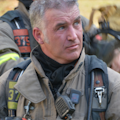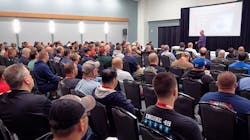Firefighters, at heart, are people who have decided to put others above themselves. The long days, the sleepless nights, answering calls 24/7 without question, all take a toll mentally and physically. There is no denying that to properly fill the role of a firefighter, one must be physically fit, but the mental aspect is just as important, and it is time to up our game.
Higher education is the key. We can’t kid ourselves into believing that a high school diploma is all that we need in the modern fire service. At some point during the progression through the ranks, there must be some form of higher education for those who lead and instruct. Do I believe that every firefighter should have a college degree? No. Do I believe that education beyond high school is necessary? Absolutely!
There is a reason the National Fire Academy produces outstanding company and chief officers through its Managing Fire Officer (MFO) and Chief Fire Officer (CFO) programs. The Center for Public Safety Excellence doesn’t randomly certify company officers, training officers, etc. These college-equivalent educational programs require thought, dedication and effort to complete. Standards are in place throughout the fire service to elevate the quality of our leadership. Although these courses aren’t mandatory, they are readily available. We must step up our game and take advantage of these opportunities.
There is a reason that some of our best research and innovation come from departments that have embraced education. My department not only encourages its members to take college level classes, it helps with financial assistance. There now are degree (associate and bachelor’s) requirements for our senior ranks, with lieutenants, captains and battalion chiefs soon to join that list. I understand that this is more of an exception than a rule, but it is an exception that is gaining traction across the country. Thumb through the trade magazines and websites and you’ll notice that degrees are being required more often than not if there are bugles attached to the rank. Make no mistake, if the fire service wants to sell itself as a professional organization, it must present itself as such.
Our membership should, regardless of its status (paid, volunteer, paid-on-call), provide competent and capable response to all hazards and emergencies that the public calls us to mitigate. Our field of expertise has evolved from just fighting fire to medical response, hazmat response, urban search and rescue, and more. If we want to be thought of as a professional organization, we should be taught and led by professionals.
Have there been great leaders who didn’t have college degrees? Of course. One of my first lieutenants never graduated high school, but I would follow him into the bowels of Hades if he said we could put it out. His knowledge was from the street and from experience, two things not to be discounted. He didn’t need a formal education to become a great leader, but I needed it to have the ability to teach and pass along his knowledge (and mine) as an instructor. We all probably can list great fire service leaders who lack advanced degrees, or alphabet soup behind their name, but at this moment in the history of the U.S. fire service, we shouldn’t argue about the role of higher education but just accept it as a necessity for growth.
We need great leaders who can navigate the political and business realm of the fire service. We need leaders who can budget and forecast, plan and sell a product that, by its very nature, is a tax burden. We need the public, who we swore to protect, to understand and respect our customer service model. We need our reports to read as educated narratives that are worthy of legal scrutiny, not as misspelled, grammatically challenged essays.
The idea of educating ourselves shouldn’t be looked at as a chore but as a continuation of the pride that every firefighter feels when that individual puts on the uniform. My intent is to begin, even on a small scale, a conversation that leads to progressive momentum. There is no reason to believe that we can’t be better tomorrow than we were yesterday—and that starts with higher education.
About the Author

Chris Garniewicz
CHRIS GARNIEWICZ is a captain with the Bluffton Township, SC, Fire District (BTFD) currently assigned to Ladder 333. He has a master’s degree in education from Northeastern University and is an IFSAC-certified Fire Instructor 2. Garniewicz began his career in the Metro Boston area, serving as a volunteer firefighter and EMT.
